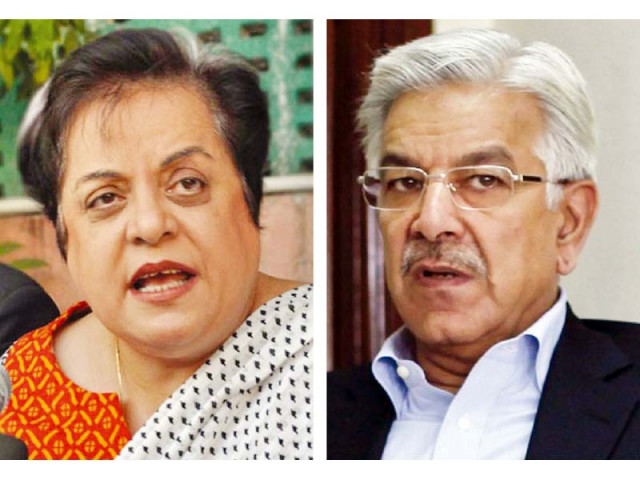Face-off: IHC offers to mediate between Mazari, Asif
Warring politicians asked to meet in court and settle differences

Shireen Mazari, Khawaja M Asif. PHOTO: FILE
The Islamabad High Court has offered to mediate between the two parliamentarians from opposite sides of the aisle on December 8.
The division bench of Justice Shaukat Aziz Siddqui and Justice Mohsin Akhtar Kayani told the counsels of both the parties to ask their clients to appear before the court on the next date of hearing.
The objective is to bring the two to the negotiating table after Asif’s derogatory remarks against Mazari on the floor of the National Assembly.
Court officials, however, clarified that the IHC did not summon the two politicians as no specific orders to appear before the bench were issued.
The remarks, however, were passed during the hearing of the Mazari’s intra-court appeal. She is seeking an intervention to create an exception in Article 69 and reinterpret its provision for the protection of women on the floor of the National Assembly.
Previously, the bench had issued preadmission notices to the respondents.
Justice Athar Minallah had dismissed her petition, which sought the disqualification of the defence minister over his derogatory remarks on the floor of the National Assembly.
Mazari named the federation a respondent through Minister for Law and Justice Zahid Hamid, Minister for Defence and Water and Power Khawaja Asif, Speaker of the National Assembly Ayaz Sadiq and the Ministry of Parliamentary Affairs through federal minister Sheikh Aftab Ahmed.
Razzaq stated that Asif, while pointing towards Mazari, made an insulting comment when she and other lawmakers were protesting against his speech on load-shedding during Ramazan.
“The impugned remarks were a malicious attempt to harass and intimidate the appellant and impede her from scrutinising the law,” he stated. He added that Mazari’s fundamental rights had been violated and no effective relief was provided to her.
The counsel said Asif made derogatory remarks against the petitioner and this was seen by millions on television. The footage is still available on certain social media forums.
He claimed the remarks were criminal in nature as Asif’s defamation of Mazari falls under Section 500 of the Pakistan Penal Code, 1860. The counsel stressed that the minister verbally harassed the MNA, which created a hostile working environment and thus violated the Protection Against Harassment of Women at the Workplace Act.
“We have rights for women in every corner of the law. We have created special provisions, statuses and even reserved seats for them in the assembly. Ironically, the same women who vehemently fought for the Protection Against Harassment of Women at the Workplace Act.
Razzaq continued that the purpose of parliamentary privilege, under Article 69 (Courts not inquiring into proceedings of Parliament) of the Constitution, is to enable parliamentarians to go about their business. However, the defence minister’s comments were personal and criminal in nature and should not be sheltered by Article 69,
he stated.
Published in The Express Tribune, November 22nd, 2016.


















COMMENTS
Comments are moderated and generally will be posted if they are on-topic and not abusive.
For more information, please see our Comments FAQ